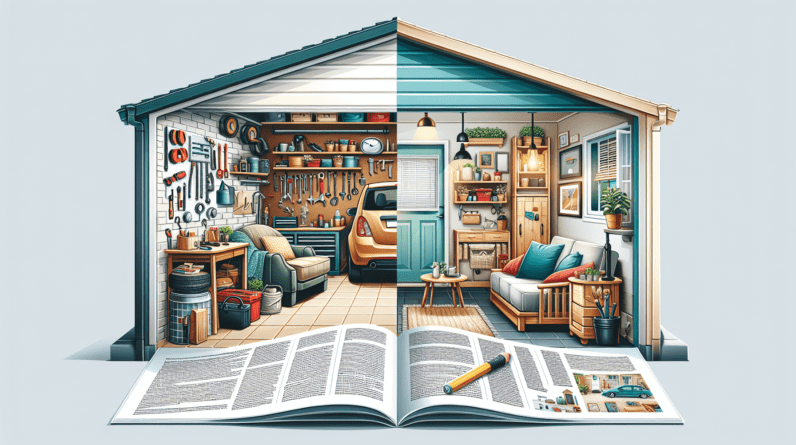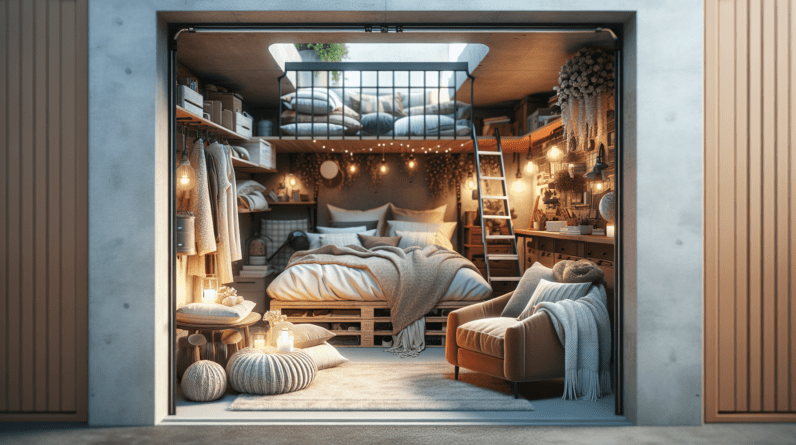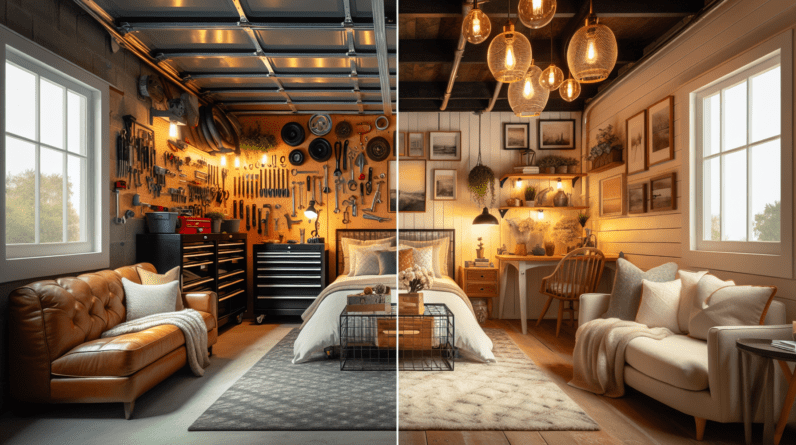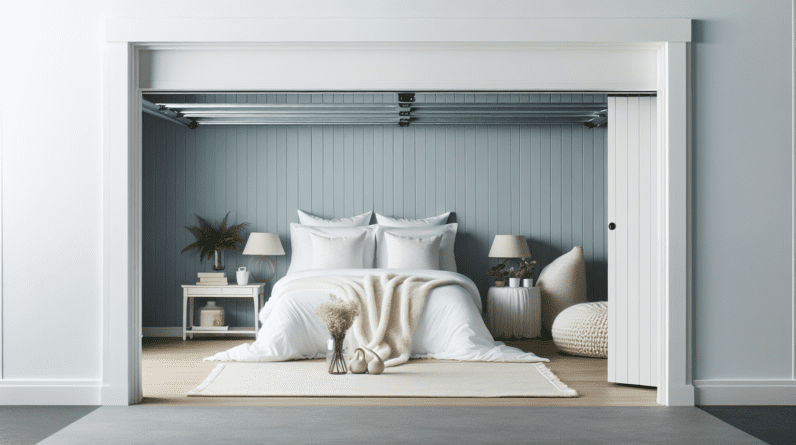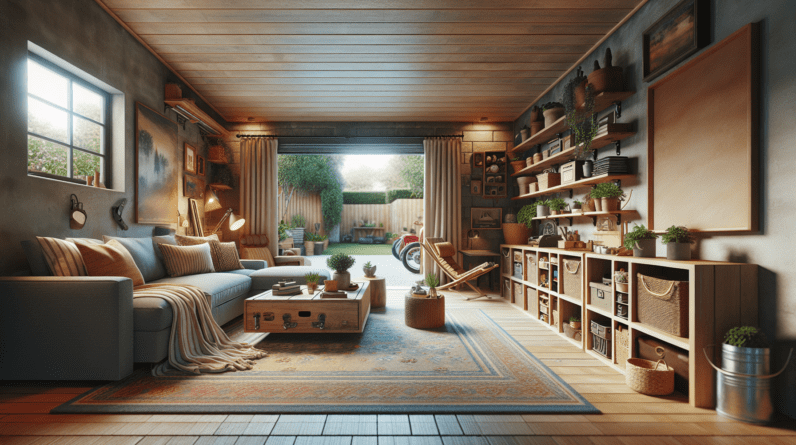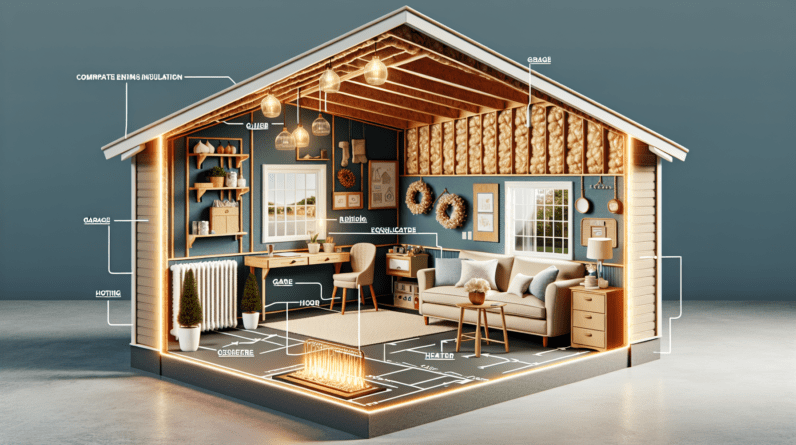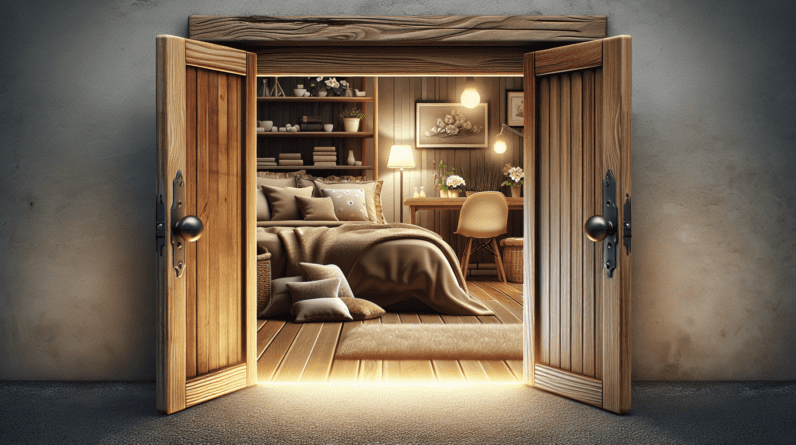
Transforming your garage into a cozy and functional guest room is an exciting home improvement project that can add both value and versatility to your space. However, before you embark on this endeavor, it’s essential to have a clear budget in mind to ensure a successful renovation. From my research, I’ve gathered valuable insights on budgeting for your garage-to-guest room transformation. By carefully planning your expenses and considering factors such as materials, labor, permits, and any additional features you may want to include, you can create a comfortable and inviting guest retreat without breaking the bank. Let’s explore the key considerations and helpful tips to help you budget wisely for your upcoming renovation project.
Assessing the Scope of the Renovation Project
Determining the Purpose of the Transformation
Before you begin any renovation project, it is important to assess the purpose of the transformation. What do you want to achieve with this garage-to-guest room renovation? Are you looking to create an additional living space for guests or potentially rent out the room? Understanding the purpose will help guide your decisions throughout the project and ensure that you allocate your budget wisely.
Making a List of Required Changes
To start planning your renovation, make a list of all the changes that need to be made to transform your garage into a comfortable guest room. This can include everything from structural modifications, such as installing windows and insulation, to aesthetic updates like flooring and wall treatments. By creating a comprehensive list, you can ensure that no important details are overlooked during the budgeting and planning process.
Consulting Professional Contractors
Once you have determined the purpose of the transformation and made a list of required changes, it is advisable to consult professional contractors. They have the experience and expertise to assess the scope of the project accurately and provide you with a realistic estimate of the costs involved. Professional contractors can also guide you through the design and permit process, ensuring that your renovation meets all building codes and regulations.
Setting a Realistic Budget
Evaluating Available Funds
Before embarking on any renovation project, it is essential to evaluate your available funds. Take a close look at your finances and determine how much you can comfortably allocate to this project. Consider your current savings, disposable income, and any other sources of potential funding. By having a clear understanding of your financial limitations, you can set a realistic budget and avoid overspending.
Researching Average Costs and Expenses
To set an accurate budget for your renovation project, it is crucial to research the average costs and expenses associated with similar projects. Look for information specific to garage-to-guest room conversions, as costs may vary depending on the scale and complexity of the renovation. Websites, design magazines, and online forums can be valuable resources for gathering information and getting a sense of the ballpark figures relevant to your project.
Considering Potential Hidden Costs
In addition to the obvious costs of materials and labor, it is essential to consider potential hidden costs when setting your budget. These can include unexpected issues discovered during the renovation, such as structural problems or outdated plumbing and electrical systems that need upgrading. It is always better to allocate a portion of your budget towards contingencies, so you are prepared for any unforeseen expenses that may arise.
Creating a Project Blueprint
Deciding on the Design and Layout
Once you have established your budget, it is time to decide on the design and layout of your garage-to-guest room renovation. Consider the overall aesthetic you want to achieve and how the space will function for your guests. Will you include a bathroom? Do you want to incorporate a kitchenette or a small sitting area? Take the time to design a blueprint that reflects your vision and meets your guests’ needs comfortably.
Determining the Necessary Permits and Permissions
Before starting any construction work, it is essential to determine the necessary permits and permissions required for your renovation project. Contact your local building department or consult with professional contractors to understand the regulatory requirements in your area. Failing to obtain the appropriate permits can result in costly fines and delays. It is important to factor in permit fees and any associated costs when setting your budget.
Seeking Inspiration and Gathering Ideas
To create a fantastic guest room, seek inspiration and gather ideas from various sources. Browse through interior design magazines, visit home improvement websites, and explore social media platforms to find inspiration for colors, furnishings, and storage solutions. Don’t be afraid to get creative and think outside the box. The more ideas you gather, the better equipped you will be to make informed design decisions that fit within your budget.
Breaking Down the Costs
Design and Architectural Fees
As you delve into the specifics of your renovation project, it is important to account for design and architectural fees. If you decide to work with a professional designer or architect, their services may come at a cost. Take the time to research and get quotes from several professionals to ensure you find someone who aligns with your vision and budget.
Materials and Supplies
Another significant aspect of your renovation budget is materials and supplies. Your list of required changes will guide you in determining the materials needed for your garage-to-guest room conversion. Whether it is flooring, paint, furniture, or fixtures, research different suppliers and compare prices to find the best deals without compromising on quality.
Labor and Contractor Costs
Unless you plan on doing all the work yourself, labor and contractor costs will make up a substantial portion of your renovation budget. When evaluating different contractors, request detailed quotes that include the cost of labor, including demolition and reconstruction, as well as any sub-contractor costs. Avoid choosing contractors solely based on price; instead, consider their experience, reputation, and the quality of their work.
Allocating Funds for Major Expenses
Structural Modifications and Repairs
When converting your garage into a guest room, structural modifications and repairs may be necessary. This can involve installing windows, reinforcing walls, or repairing any existing damage. Allocate a portion of your budget to cover these major expenses, as they can significantly impact the overall functionality and safety of your guest room.
Insulation, Heating, and Cooling Systems
To ensure your guest room is comfortable year-round, proper insulation and efficient heating and cooling systems are vital. This can include insulating the walls and ceiling, upgrading the HVAC system, and installing proper ventilation. These expenses are essential for creating a pleasant environment and should be factored into your budget accordingly.
Electrical and Plumbing Upgrades
If you plan to include a bathroom or kitchenette in your guest room, electrical and plumbing upgrades will be necessary. This can involve installing new wiring, outlets, and plumbing fixtures. It is important to allocate sufficient funds for these upgrades, as they are essential for the functionality and safety of your guest room.
Budgeting for Aesthetics and Comfort
Flooring and Wall Treatments
The choice of flooring and wall treatments can greatly impact the overall look and feel of your guest room. Consider options that are durable, easy to clean, and within your budget. Whether you prefer hardwood, laminate, carpet, or tile, research different materials and their costs to ensure you make an informed decision that suits your desired aesthetic and budgetary constraints.
Lighting Fixtures and Window Treatments
Lighting fixtures and window treatments play a crucial role in creating ambiance and enhancing the comfort of your guest room. Invest in good-quality lighting fixtures that provide adequate illumination and complement your chosen design style. Similarly, opt for window treatments that allow for privacy while still allowing natural light to filter in. These elements can greatly enhance the overall aesthetic and functionality of the space.
Furniture, Bedding, and Decor
Furniture, bedding, and decor are the finishing touches that tie your guest room together and create a welcoming atmosphere. Allocate a portion of your budget to invest in comfortable and functional furniture, as well as quality bedding and decor items. Consider shopping sales or looking for second-hand options to save money without compromising on style and comfort.
Incorporating Additional Features
Creating a Functional Bathroom
If you plan to include a bathroom in your guest room, allocate a portion of your budget to create a functional and aesthetically pleasing space. Consider the necessary plumbing fixtures, such as a sink, toilet, and shower or bathtub. Additionally, invest in quality materials and finishes that are both durable and visually appealing.
Adding Storage Solutions
To maximize the functionality of your guest room, incorporate adequate storage solutions. This can include built-in closets, shelving units, or under-bed storage options. Allocate funds to invest in quality storage systems that make efficient use of the available space and help your guests keep their belongings organized during their stay.
Incorporating Technology and Entertainment
To enhance the comfort and enjoyment of your guests, consider incorporating technology and entertainment features into your guest room. This can range from installing a television and sound system to providing Wi-Fi access. Set aside a portion of your budget to invest in these amenities, as they can greatly enhance the overall guest experience.
Considering Energy Efficiency
Investing in Energy-Efficient Appliances
When choosing appliances for your guest room, consider investing in energy-efficient options. Energy-efficient appliances can help reduce your energy consumption and lower utility bills in the long run. While they may have a slightly higher upfront cost, the savings over time make them a worthwhile investment.
Insulating the Space for Optimal Temperature Control
Proper insulation is crucial for maintaining optimal temperature control in your guest room. Insulate walls, ceiling, and floors to minimize heat transfer and ensure your guests are comfortable year-round. Assess the current insulation levels and allocate funds for any necessary upgrades or improvements.
Installing Energy-Saving Lighting
Switching to energy-saving lighting options, such as LED bulbs, can significantly reduce energy consumption and lower your electricity bills. Allocate a portion of your budget to invest in energy-efficient lighting fixtures and bulbs for your guest room. While the initial cost may be slightly higher, the long-term savings make it a cost-effective choice.
Researching Financing Options
Exploring Personal Savings and Loans
When it comes to financing your garage-to-guest room renovation, start by exploring your personal savings and loans. Assess your current financial situation and determine if you have sufficient savings to cover the cost of the project. If not, consider getting a personal loan from a reputable financial institution. Compare different loan options and interest rates to find the best fit for your needs.
Considering Home Equity Loans or Lines of Credit
Another financing option to consider is a home equity loan or line of credit. If you have built up equity in your home, you may be eligible for borrowing against it to fund your renovation project. These types of loans often offer lower interest rates compared to personal loans, making them an attractive option if you qualify.
Investigating Government Assistance Programs
Depending on your location and circumstances, there may be government assistance programs available to help finance your renovation. Research local grants, subsidies, or tax credits that may apply to your garage-to-guest room renovation project. These programs can provide financial relief and make your renovation more affordable.
Allowing for Contingency Funds
Accounting for Unexpected Expenses
No matter how well you plan and budget, unexpected expenses can arise during any renovation project. It is essential to allocate funds for contingencies to account for these unforeseen costs. This will provide you with peace of mind knowing that you have a financial cushion to handle any unexpected situations that may arise.
Setting Aside 10-20% of the Total Budget
A good rule of thumb when setting aside contingency funds is to allocate 10-20% of your total renovation budget. This percentage allows for flexibility in case of any surprises or changes that may occur during the renovation process. By setting aside these additional funds, you can ensure that your project stays on track and within budget, even if unexpected costs arise.
Being Prepared for Delays or Unforeseen Challenges
In addition to unexpected expenses, it is important to be prepared for delays or unforeseen challenges that may arise during your renovation project. Sometimes, issues beyond your control, such as inclement weather or unavailable materials, can cause delays in the construction process. By accounting for these potential setbacks in your budget and timeline, you can navigate any challenges smoothly and avoid unnecessary stress.
In conclusion, budgeting for your garage-to-guest room renovation project requires careful consideration of the scope of the project, setting a realistic budget, and allocating funds for various expenses. Assessing the purpose of the transformation and making a list of required changes will help you understand the project’s scope. Evaluating available funds and researching average costs and potential hidden costs will help you set a realistic budget. Creating a project blueprint, breaking down the costs, and allocating funds for major expenses will guide your spending decisions. Budgeting for aesthetics and comfort, incorporating additional features, considering energy efficiency, researching financing options, and allowing for contingency funds are crucial aspects to consider. By following these steps and being thorough in your planning, you can ensure a successful and satisfying garage-to-guest room renovation project that meets your needs and budget.

